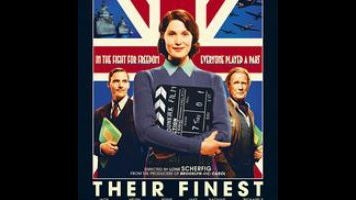If writing is one of the more uncinematic activities movies are often tasked with bringing to life, depicting screenwriting may be even more challenging, especially if the filmmakers aren’t dealing in satire and/or chronicling writer’s block. (Call that the Adaptation/Barton Fink exception.) Films about novelists or poets can at least pretend that their makers aren’t thinking of themselves the whole time; films about screenwriters have no such deniability.
The process is seen largely through the eyes of Catrin Cole (Gemma Arterton), a neophyte screenwriter brought on to work on what another team member refers to as “slop”—women’s dialogue for a project sorely lacking a female perspective. She’s sort of a wider-eyed creative-class Peggy Carter, head often tilting upward to stare with quiet wonder at some sight or another. The unexpected screenwriting gig, which Catrin initially mistakes for a secretarial job, gets her out of the home she shares with Ellis (Jack Huston) and under the tutelage of head writer Tom Buckley (Sam Claflin).
For their big movie, the filmmakers eventually settle on a not-especially-true story from the evacuation of Dunkirk—an event that, in a neat bit of timing, is about to be brought to IMAX-sized life by Christopher Nolan later this year. Their Finest offers more of a budget footnote, essentially fabricated from the basics of an anecdote about two sisters who stole a boat to go help rescue stranded soldiers. The players include faded star Ambrose Hilliard (Bill Nighy) and, in a concession to American audiences, actual war hero Carl Lundbeck (Jake Lacy), who arrives on set with no acting experience. Catrin and Tom must roll with the punches and deliver rewrites on the fly, accounting for actor-related obstacles as well as some cultural tiffs—the American distributor asks for a bigger emotional punch at the end of the film, finding the original finale “too restrained.”
“Restrained” is about right. Much of the comedy/drama/romance hybrid Their Finest is charming and amusing, if not exactly uproarious—though Lacy comes close to the latter when he delivers his first lines shouting straight at the camera and grinning like a fool. For the most part, the movie’s Britishness is such that most conflicts are expressed through cordial disagreement, and any personal flirtations between Catrin and Tom remain at a low boil. Director Lone Scherfig operates with so much restraint, in fact, that the movie’s biggest moments don’t always play as well as they should. A scene where Nighy sings at a cast party has bittersweet stirrings, but Scherfig mutes the effect by cutting to reaction shots. Later on, a major dramatic turn is intentionally abrupt, but it feels almost like a parody of stiff-upper-lip stoicism just when the story is supposed to deliver a gut punch.
But if Their Finest is a little stodgy and tasteful, it also possesses Scherfig’s trademark wistfulness. She’s Danish, but An Education, One Day, and Their Finest all master that pale, blue-gray English mood, and all more or less deliver emotionally in the end. Arterton is instantly likable without overplaying her considerable pluck factor, and similarly, Claflin doesn’t turn the head screenwriter into a dashing hero. He’s witty and handsome, sure, but also kind of a dork in a mustache. They help make the movie’s argument for filmmaking as a practical endeavor with an emotional core, and one that ought to consider women as a major component of the audience. That makes the cornball fictional movie within Their Finest more humane and sophisticated than any number of blockbusters.
















![HBO teases new Euphoria, Larry David, and much more in 2026 sizzle reel [Updated]](https://img.pastemagazine.com/wp-content/avuploads/2025/12/12100344/MixCollage-12-Dec-2025-09-56-AM-9137.jpg)
























